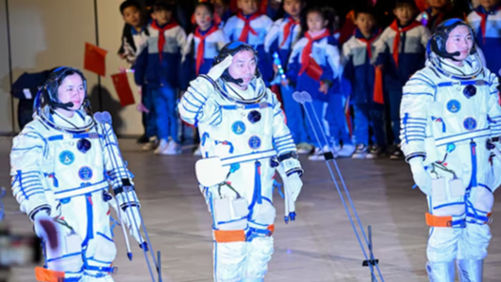Three Chinese astronauts, including the country’s only female spaceflight engineer, launched on a significant mission to the Tiangong space station early Wednesday morning. This mission is seen as a step toward China’s goal of sending astronauts to the Moon by 2030 and eventually building a lunar base.
The Shenzhou-19 mission lifted off at 4:27 AM from the Jiuquan Satellite Launch Center in northwest China, as reported by state news agency Xinhua and state broadcaster CCTV. The mission aims to conduct various experiments, contributing to China’s broader space program.
Crew Composition
Among the astronauts is Wang Haoze, 34, who is noted as China’s only female spaceflight engineer and the third Chinese woman to participate in a crewed space mission. The China Manned Space Agency (CMSA) confirmed that the launch was a “complete success.”
“I dream of going to the space station to have a look,” Wang stated during a press conference with her fellow astronauts. “I want to meticulously complete each task and protect our home in space. I also want to travel in deep space and wave at the stars.”
Mission Leadership and Goals
The team is led by Cai Xuzhe, a 48-year-old former air force pilot with experience from the Shenzhou-14 mission in 2022. Cai expressed his sense of honor and responsibility regarding the new role and mission. He stated, “Having been selected for the new crew, taking on a new role, facing new tasks and new challenges, I feel the honor of my mission with a great responsibility.”
The third crew member is Song Lingdong, also 34 years old. The astronauts currently aboard the Tiangong space station are set to return to Earth on November 4 after handing over their duties to the new crew.
China’s “Space Dream”
China has intensified its efforts to realize its “space dream” under President Xi Jinping. The country’s space program is the third in history to send humans into orbit and has achieved significant milestones, including landing robotic rovers on Mars and the Moon.
The Tiangong space station, which features rotating teams of three astronauts every six months, serves as the centerpiece of China’s space endeavors. Beijing aims to send a crewed lunar mission by 2030, with plans for a base on the Moon’s surface.
Experiments and Research
While aboard Tiangong, the Shenzhou-19 crew will conduct several experiments, including tests on “bricks” made from materials that simulate lunar soil. These items will be sent to Tiangong by the Tianzhou-8 cargo ship in November. The research will explore how these materials react to extreme conditions like radiation, gravity, and temperature.
Chinese scientists hope to utilize lunar soil for future construction due to the high costs associated with transporting materials to space. Jonathan McDowell, an astronomer at the Harvard-Smithsonian Center for Astrophysics, emphasized that the Shenzhou-19 mission is about “accumulating additional experience.” He noted that while this crew exchange may not lead to major breakthroughs, it is still “very valuable to do.”
Investment in Space Exploration
China has invested billions in developing a competitive space program to match that of the United States and Europe. Notably, in 2019, China landed its Chang’e-4 probe on the far side of the Moon, marking a historic first. In 2021, it successfully landed a small robot on Mars. The Tiangong station, whose core module launched in 2021, is expected to operate for approximately ten years.
















